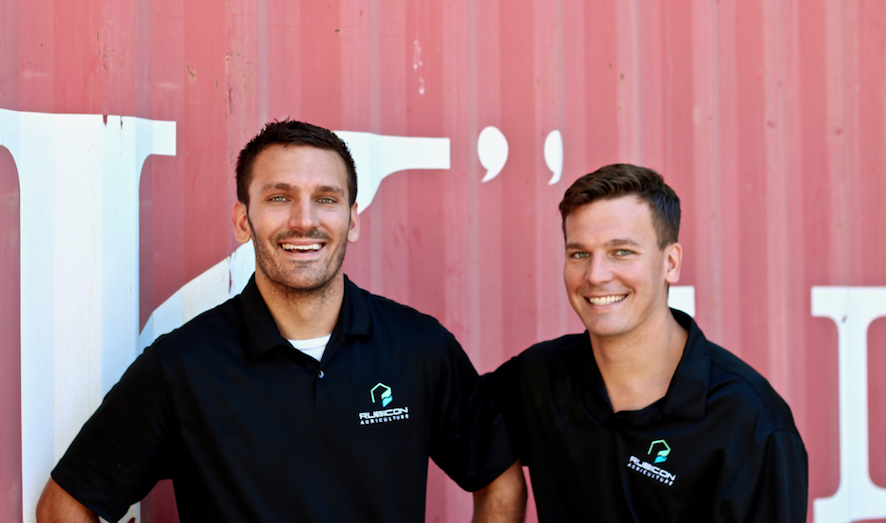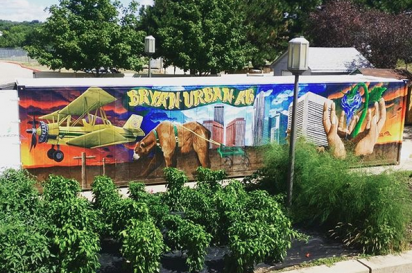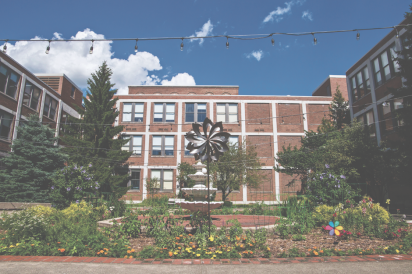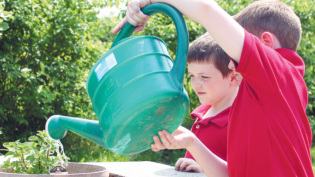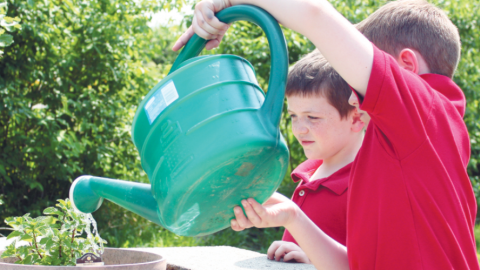Harvesting Knowledge
“This is amazing! We need this and we have to figure out how to get it!” were the words Ben Carter, director of career and technical education for Indianapolis Public Schools (IPS) first uttered upon seeing a Rubicon Agriculture Living Learning Lab AgroBox—a onetime industrial shipping container riding on a flatbed railroad car.
“It sparked my interest in the learning opportunities that were possible,” he explained. With a sleek white interior and gleaming silver gauges measuring all aspects of a controlled environment, it looked like an engaging place to capture the attention of chemistry and biology students. An added bonus: The hydroponic mini-farm had the capability of producing leafy greens and other vegetables at a fast rate while using fewer resources than a traditional outside garden. And the resulting produce can be used to supplement a school’s food-service program.
Rubicon Agriculture is headed by CEO Chris Moorman and is the combined brainchild of his brother Eric Moorman and two friends, Pat Burton and Jesse Robbins. After graduating from Purdue University, Chris worked for several years as a commodity trader before taking a yearlong trip around the world. While on a 27-hour train ride through South Africa, he met a man who repurposed used shipping containers into prefab homes. As his travels continued, he kept noticing empty shipping containers in various ports and realized that although they were worthless without a cargo, there must be an upcycling idea for them somewhere.
Idea Emerges
One Saturday morning out of sheer boredom, the friends attended a “Doomsday Preppers” convention at the Indiana State Fairgrounds. The booths featured equipment needed to survive and become self-sufficient if society should collapse due to a catastrophic emergency, and they found themselves absorbed by a display on hydroponic farming. With their individual varied skill sets, such as knowledge of programmable logic controllers and pumping systems, the idea of using recycled shipping containers to hydroponically grow produce came together.
By July 2015, Rubicon Agriculture became a business: A source for securing the used containers from Burlington Northern Railroad was found and after constructing an initial prototype, the partners came away with an increased knowledge to build viable, successful AgroBoxes. Today, these 40-foot shipping containers—which take up the space of six parking spaces—are outfitted with LED lighting as well as automation for controlling water recirculation, temperature, ventilation and pH levels. A television screen and camera are installed so the interior can be monitored at all times and long-distance learning opportunities with other institutions, such as schools or nursing homes, can be facilitated.
Pass the Vegetables: What Happens When Kids Grow Their Own Food?
Besides the produce grown in the AgroBox’s controlled environment, Shortridge students also have the opportunity to experience traditional outdoor gardens. Overseen by parent volunteer Cathy McElroy, a chef at Duos in Indianapolis, the gardens are not only a riot of color and beauty, but also an irresistible ploy to encourage students to eat their vegetables. McElroy’s mantra is “Love Fresh Food” and her enthusiasm is contagious as she talks about the courtyard garden and street-side raised beds.
Edible Indy: Where did the idea of creating a student garden come from?
Cathy McElroy: The neighborhood surrounding the school is a food desert; there are no grocery stores nearby. In the cafeteria, all the kids see is plastic-wrapped food. Why would we expect them to know about fresh food without seeing where it comes from?
EI: Has the administration been supportive?
CM: I was one of several who nominated Principal Shane O’Day for United Way’s Hubbard Life-Changing Educator Award, which he recently won. He realizes that the gardens promote healthy living and afford students the opportunity to be food conscious.
EI: How is it funded?
CM: At first, I either contributed plants myself or solicited donations from nearby business. This past year I applied for and received a grant from the Foundation for Complex Health Care Solutions. Research shows that when kids grow their own food, they will eat it and the foundation felt the garden program promoted preventative measures to maintain good health.


